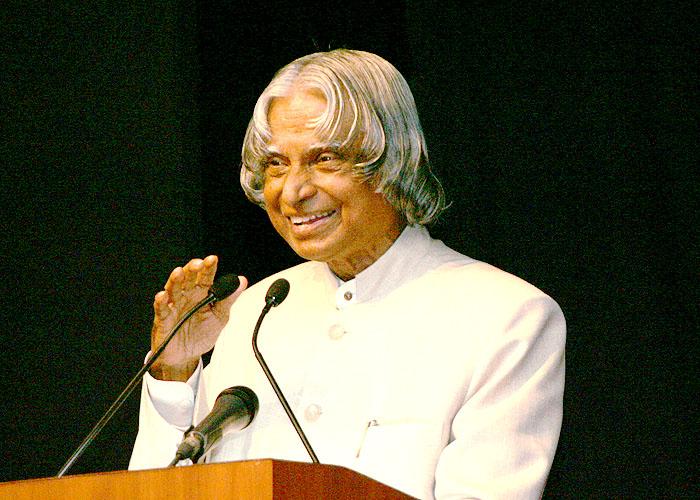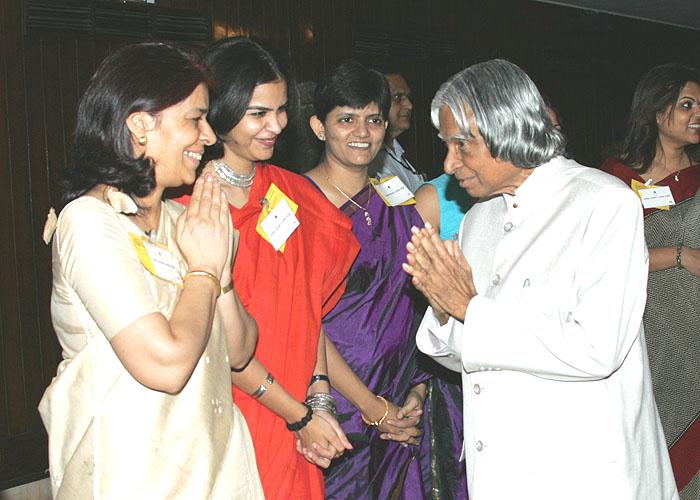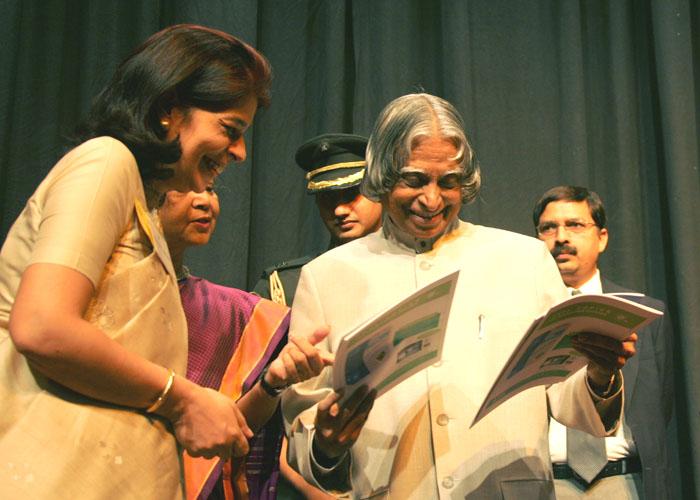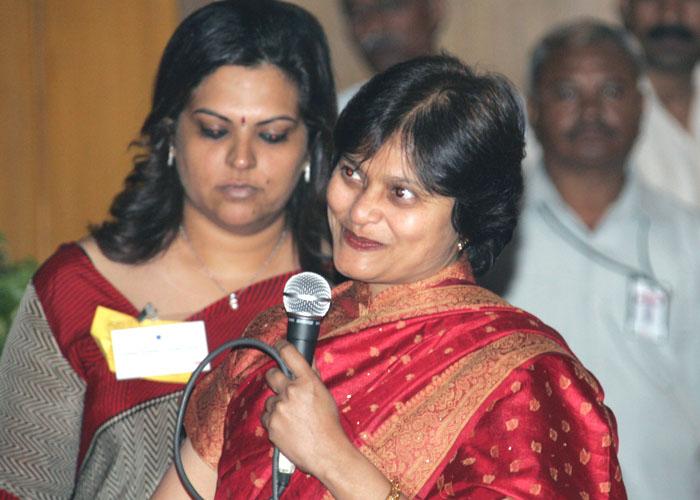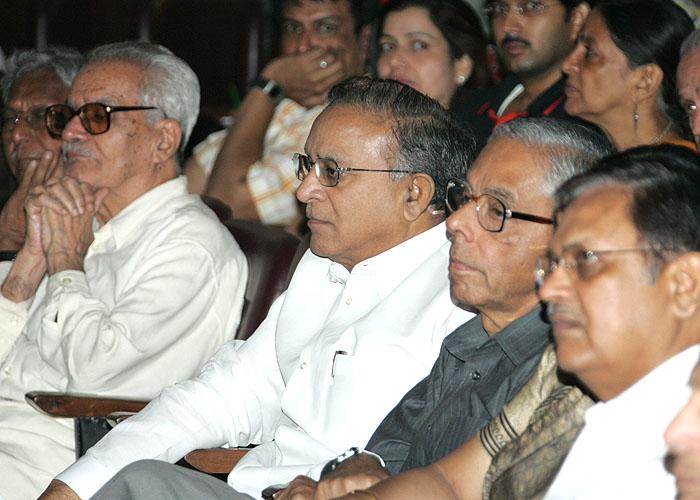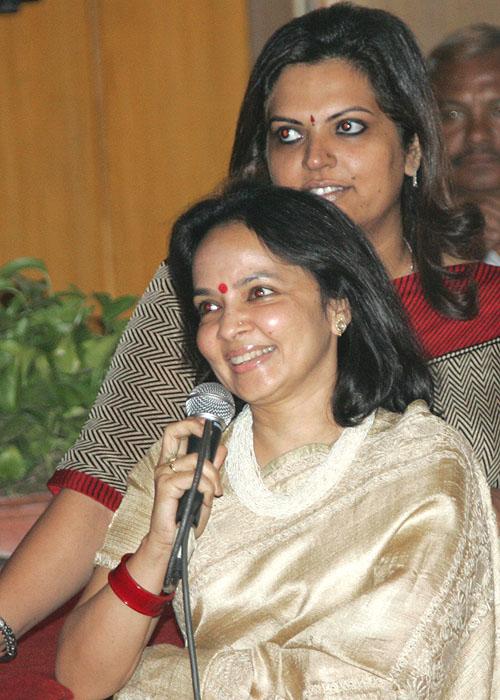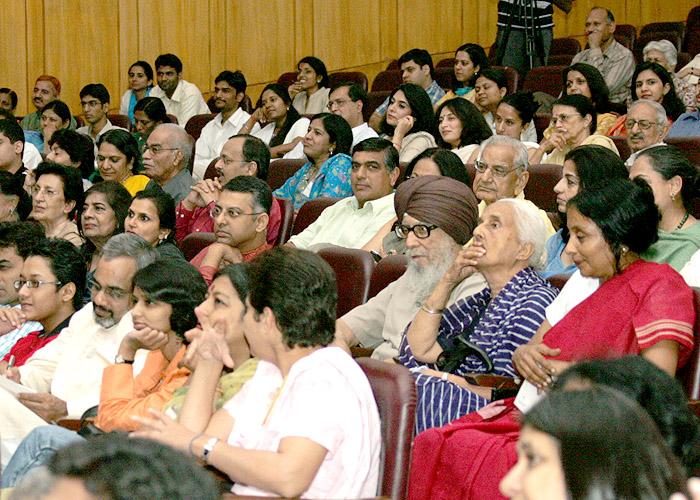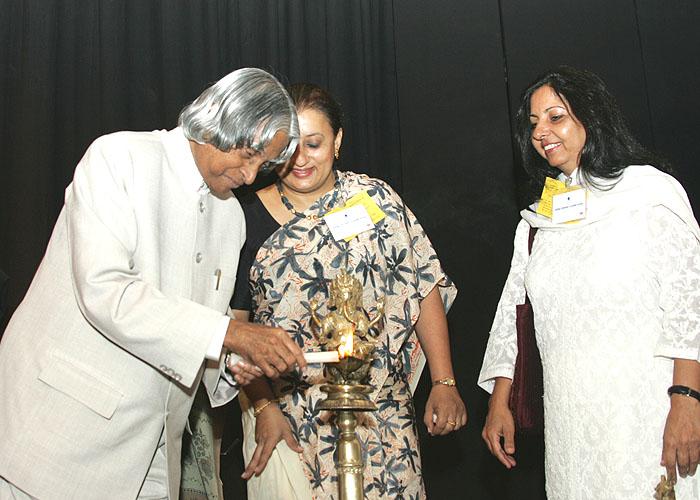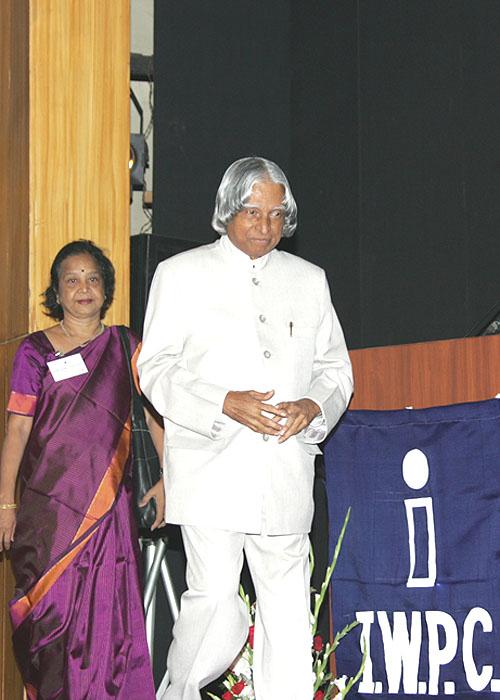Address At The Annual Function Of Indian Women'S Press Corps
New Delhi : 09-10-2005
Media for Billion people
I am delighted to participate in the 11th anniversary celebrations of Indian Women's Press Corps (IWPC). I greet the organizers, members of the women press corps, media specialists and distinguished guests. I am very happy to know that IWPC seeks to encourage women journalists, promote debate about women issues and provide a forum for networking with fellow professionals, politicians, bureaucrats and academics. Networking is indeed a big challenge. Women journalists in India have already made their mark. I am sure they will excel in their profession and become an influencing factor in handling news and analysis. This is the era of Women Empowerment. Women through their entrepreneurial skill can become a leading light for many journalists to follow. Such tasks like Multimedia design, event photography, videography, investigative journalism, analytical writing and participating in media research. Women are indeed contributing in all walks of life. On this occasion I would like to discuss with you on the topic "Media for Billion people".
Media for Billion people
In a billion people of our country, seven hundred million people living in six hundred thousand villages the events and news have to be unique and large when compared to other countries. Hence our print media has got a great challenge. Our news reporting is mainly urban based in many of our States. This situation needs change. I consider the newspapers or media are indeed a partner in our national development. A partner means "somewhere an innovative use of organic cultivation is taking place and the productivity of wheat or rice is increased by two times", this indeed is a very important news. This news must be studied, analyzed and propagated to many places in the country. Similarly, a water pond which for years were remained unused and the farmers have collectively worked together and make it operational, this indeed a big news and must be reported. Such reporting will enable desilting and rejuvenation of lakhs of water bodies which are non-operational today in many of the States. Similarly, a constructive criticism of how the Panchayat is working, how the flow of funds from the Government is reaching the required development project must also be reported so that necessary corrective measures can emanate. Now I would like to discuss the importance of media research.
Media Research
I have a suggestion particularly to the members of Indian Women's Press Corps consisting of editors, journalists, correspondents and reporters. In our country it is essential to have research wings in the academic institutions and media establishments in developing quality and proactive media personnel in reporting news, event analysis, and multi-media design. The owners of news papers and electronic media should encourage research being carried out by experienced and young reporters for acquiring post-graduate qualifications which will improve the quality of content of the print and electronic media. For example, before any issue is discussed in foreign newspapers and electronic media, they send it to an internal research group where data is studied; verified and factual news is generated and sent for publication and broadcasting. When there was a critical comment about outsourcing to India, a US journalist stayed in India and studied the issue and found out that the companies engaged in Business Process Outsourcing (BPOs) were carrying out business using imported equipments from UK and USA. Thus, they found that the BPO industries provided an indirect market for the hardware industries of US. Immediately this was reported in the Indian media in a big way. Similarly a Discovery Channel media person wanted to study India's growth in Information Technology; Thomas Friedman came to India and stayed for a month and visited Bangalore and other places. Based on his news analysis he wrote a book titled "World is Flat". This book has become famous not only in India but throughout the world. Such is the power of research. I would suggest our Indian newspaper agencies and electronic media should encourage research being carried out by our correspondents and journalists within India in an academic research institution or media establishments which will definitely improve the quality of our reporting and analysis.
Emerging women
While talking to you, I am reminded of Mahakavi Subramaniya Bharatiar, who in 1910 composed the poem envisioning women of India:

This beautiful poem means -
She walks with raised head, with her eyes looking straight,
She has her principles, unafraid of anybody!
She has a lofty and knowledge based pride,
Women of excellence, don't falter from the chosen path.
She drives ignorance away. She welcomes the bliss of life.
With learned mind, this is the Dharma of emerging woman.
The dream of the poet for emerging women aptly suits the women journalists in the country. The poem highlights the power of the knowledge of women. Now, I would like to discuss the role of woman in nation building.
Women in Nation Building
In our country, women constitute 48% of the total population. Recently, when I was in Himachal Pradesh, Vijaya Sharma of Rajkiya Kanya Mahavidyalya asked me what should be the girl's role in independent India. I told her that there is really no difference in the roles. They are equal partners in national development.
Now-a-days women are shining in every field. They are becoming doctors, engineers, advocates, teachers, political leaders, administrators, police officials, professionals, business persons, media persons and they also have joined the Armed Forces. You have all got to get ready to take the responsibility of promoting a noble society.
I would like to share some of my experiences, where I have found women performing pioneering work in their area of specialization. I was inaugurating the "2nd National Conference for Women in Police 2005" on 27th July 2005 at Uttaranchal. There I met Smt. Kanchan Choudhry Bhattacharya, the First women to become the Director General of Police of Uttaranchal. I have seen many of the captains of the commercial aircrafts who are women pilots. In the health care and education sector women are leading. In political field also many women are playing a leading role. At Delhi, I met two very senior Air Force and Naval Officers, Air Marshal (Mrs.) P. Bandopadhyay, Director General, Medical Services (Air) and Surg. Vice Admiral (Mrs.) Punita Arora, Director General, Medical Services (Navy). They are doing pioneering work in medical field. On 27th June 2005, the Chief of Army Staff brought the first women summiteers Capt (Ms.) Sipra Majumdar and Capt. (Ms.) Ashwini AS Pawar, who climbed Mt. Everest from the North side, that is from the Tibetan side. I also talked to the women army officers in the freezing temperature at Kargil, when I met them at Kargil. I appreciate their courage and perseverance for succeeding in their missions. During 1980s to 90s there was colleague of mine in DRDO, Smt. Rohini Devi, scientist in the area of composites. She was responsible for developing the heat shield system for AGNI missiles. Dr. Shanta who was recently conferred Raman Magsaysay award, I am familiar with her work in cancer research. She was responsible for setting up the Radiation Oncology Department in Cancer Institute and organized the first-ever hospital tumour registry in India. She also established the first pediatric oncology unit. Above all the Nobel Laureate Mother Theresa represents the embodiment of removing the pain of the sufferings. These women who have performed pioneering work in their own area of specialization should become role models for all of you. Similarly, in journalism, many of you are well known for your pioneering work, reporting and columns.
Particularly, enlightened women are very important for nation building since their thoughts, the way of working and value system will lead to faster development of a good family, good society and a good nation. Thus, the women in all walks of life have tremendous opportunity for participating in the development of the nation. One of the programmes in which they can make significant contribution is PURA.
Women Engineering College and Rural Development
I had visited Periyar Maniammai College of Technology for Women, Vallam in Thanjavur District of Tamil Nadu and inaugurated a PURA Complex. I thought of sharing with you the developmental concept of a cluster of over 65 villages near Vallam, Thanjavur district of Tamilnadu which involves a population of 3 lakhs.
This PURA complex has all the three connectivities - physical, electronic and knowledge - leading to economic connectivity. The centre of activity emanates from the women engineering college that provides the electronic and knowledge connectivity. Periyar PURA has health care centres, primary to post graduate level education and vocational training centres. This has resulted in large scale employment generation and creation of a number of entrepreneurs with the active support of 850 self-help groups. Two hundred acres of waste land has been developed into a cultivable land with innovative water management schemes such as contour ponds and water sheds for storing and irrigating the fields. All the villagers are busy in either cultivation, planting Jatropha, herbal and medicinal plants, power generation using bio-mass, food processing and above all running marketing centres. This model has emanated independent of any government initiative. The committed leadership has been provided by the Periyar Maniammai College of Technology for Women. This gives me the confidence that PURA is a realizable proposition and this movement can be multiplied by thousands of entrepreneurs, educational administrators and philanthropic institutions with the support of the government agencies. I would recommend Indian Women's Press Corps to undertake development of a cluster of villages in the PURA mode. Now, let us discuss the role of women journalists, in our society.
Women journalists for reporting with compassion
We have a very pro-active media in the country who have many times excelled themselves in not only reporting crime but also in ensuring peace and harmony. Women journalists have also significantly contributed in this regard. Annual meet like this would enable all journalists to share with each other the lessons and experiences in their own area of reporting. That will provide a wholesome and holistic approach to the problems which are to be tackled by them.
Of late, the incidence of crimes against women has gone up and the role of the journalists, particularly women journalists has become quite crucial in such cases. Nobody can understand woman's problem better than another woman and therefore the role of women journalist becomes all the more critical. Womankind known for its innate humanness, sympathy and compassion is best suited to tackle all problems. Particularly, when there is so much emphasis on reformative approaches rather than retributive ones.
Our civilizational heritage is indeed the summation of motherly love, with continuity. This continuity ensures, children to imbibe the love for fellow human beings who are in pain. I would like to narrate an incident. As you are all aware, on 26th December 2004, Tsunami hit the coastal areas of southern India and Andaman & Car Nicobar Islands. At 10" O'clock on that day, the concerned State Governments and Central Government mechanism through the Civil Administration, Police and Armed Forces and other related ministries were pressed into service. However, within an hour of disaster, before the Government machinery arrived for rescue operations, social organisations all around the places and many benevolent human beings reached the spot and started rescuing the hapless and started providing food and medical care. Not even one single untoward incident was reported, where the people in distress where exploited. Friends, when similar events happened elsewhere in the world, how the people behaved, I don't want to describe. Particularly, the women journalists should take note of this and cherish our civilizational heritage and sing its praise.
Mission of Women Journalists
Every member of the women's press corps has her own dream. It has to be groomed. When I think of success in life, first requirement is that every one of us has to have a mission or goal. Realization of a mission or goal is achieved through four step process. The first one is to have a goal on, where you would like to reach in the next five years. The second one is to acquire the knowledge and experience needed to reach that goal. Third one is continuous hard work, which I call "sweat, sweat and sweat". The fourth one is perseverance and ability to face problems and solve by becoming master of the problems and succeed. If you follow these four steps you will definitely succeed in all your missions in life.
Suggested Actions
Now I would like to give five suggestions regarding the actions which could be taken by the members of the Indian Women's Press Corps.
(a) IWPC can constitute a multi-disciplinary team to study and bring out an objective report on the problems faced by women journalists working in different parts of the country through systematic research. This can be done in collaboration with journalism and mass communication department of one of our universities.
(b) The report of the multi-disciplinary team can be discussed in a two day seminar organized for this purpose by the IWPC during early 2006. The seminar can debate each issue raised in the report and suggest actions to be taken by various agencies such as Government, NGOs, society, media organizations and the journalist themselves.
(c) IWPC can create a website wherein the findings of the report and the results of the Conference can be put for the study of members and common public. The members can be asked to comment on the recommendations and their reservations if any. Based on this feedback IWPC can work out an action plan to be submitted to the Government so that a unified corrective action can emerge.
(d) The Corps could organize workshops for young women journalists who have recently joined media organisations to improve their skill sets so that they could contribute to their organizations in their reporting through a women's perspective and influence the news and issues to be handled.
(e) IWPC can create a movement through which they can enhance the literacy among women which is essential for creating awareness among our women for contributing to the cause of national development.
(f) I have designed an eight point oath for village citizens, emphasizing the need for treating both male and female children equally. I have administrated this oath in number of villages in many states during my visit.
I would like to share with you the oath that you can spread.
Declaration by the village citizens
i. Children are our precious wealth
ii. We will give equal importance for male and female children in providing education and rights for growth of our society.
iii. For health and prosperity we will have a small family.
iv. Earnings come out of hard work. We will not waste it in gambling and liquor.
v. We need to tell our children about the importance of education as learning gives knowledge and knowledge makes the children succeed.
vi. We need to jointly protect our forest and prevent pollution.
vii. We will plant at least five trees/saplings.
viii. We will become the role models for our children.
I would request the journalists assembled here to propagate the contents of this oath to all applicable sections of the society.
Empowerment
When a child is empowered by the parents at various phases of growth, the child gets transformed into a responsible citizen. When a teacher is empowered with knowledge and experience, good young human beings with value systems emerge. When an individual or a team is empowered with technology, transformation to higher potential for achievement is assured. When a leader of any village empowers his or her people, leaders are born who can change the nation in multiple areas. When women are empowered, society with stability gets assured. When the political leaders of the nation empower the people through visionary policies, the prosperity of the nation is certain. When religions are empowered and become spiritual force, peace and happiness will blossom in people's heart. When noble journalists are empowered, democracy flourishes.
Conclusion: Permanency of virtual world
Today, computers and communication technology have grown to such an extent that the world has shrunk to be a global village. Further, the communication has also become rich in its content and has transcended from mere text that we see in the newspapers to voice as we hear in the radio news to very rich multimedia that we see in the television. Because of the plummeting cost of storage, today all of these are available in the Internet and would be preserved for our future generations to learn about their past, and also pass judgments on our quality of mind. So, what you write today will become permanent in the virtual world of Internet and generations would see. Hence, the journalists of today will not be forgotten in the human history merely after the event is over. They will be remembered for many more years. The responsibility in such a technologically enhanced world of communication on the part of the journalists is immense. In one of my books, I have written a statement "every human being irrespective of who he/she is and what status he/she holds, has a page in the history of human beings in the planet." Please remember you have many pages in human history. My greetings to all of you during your 11th anniversary celebrations and best wishes to all the members of the Indian Women's Press Corps in their mission of promoting excellence in journalism.
May God bless you.

